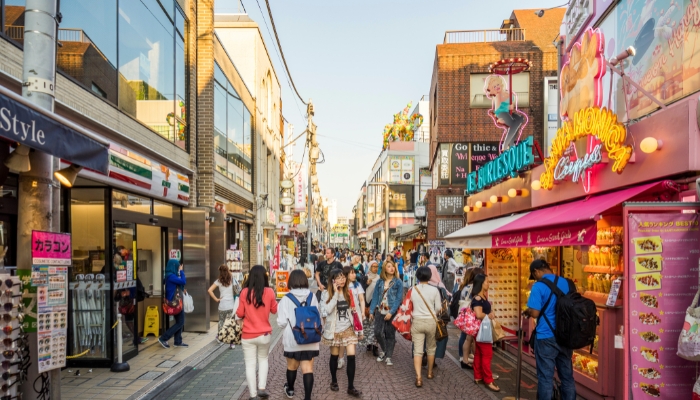Business
Why Chinese Shoppers Are Flocking to Japan for Luxury Goods

- The weak Japanese yen has made luxury goods significantly cheaper in Japan, attracting a surge of tourists, especially from China, for shopping.
- Luxury brands like LVMH have experienced growth in Japan but face challenges as Asian customers prefer shopping there, impacting profits in their home countries.
- Japanese retailers are welcoming the influx of tourists by hiring Chinese-speaking staff and ensuring the authenticity of luxury goods, further boosting the travel retail market.
For many Chinese consumers, the $2,300 cost of the Louis Vuitton Speedy Bandouliere 20 bag is too expensive. This is one of the reasons that a growing number of these are going to Japan and where the exact bag is more than $400 less.
The Weak Yen’s Impact on Luxury Shopping
Tourists, especially from China, take advantage of the low Japanese yen, to enjoy discount coupons on luxurious products. This advantage in currency has caused increased visits to Japan mostly for shopping. In May, more than three million visitors traveled to Japan in accordance with the Japan National Tourism Organization. Of them, 1.3 million were from mainland China during the first quarter of the year which is an astonishing year-on-year rise of nearly 800 percent. This surge was accompanied by the yen hitting its lowest level in 34 years in April. Despite efforts by Japan to raise rates of interest, the currency has remained weak in comparison to its counterpart, the U.S. dollar, effectively making certain goods cheaper to travelers. As an example, the TAG Heuer watch priced at $6,450 in New York can be found at around $5,000 in Tokyo and includes the 10 percent discount on duty-free purchases for American travelers.
Shopping Sprees Top Tourist Itineraries
In the end, most tourists are drawn to shopping when they travel to Japan. “Shopping, shopping, shopping,” one Indonesian tourist said to Reuters. “High-end brands are cheap here. We are going to buy Dior but we are going to Chanel first.” Japanese retail sales increased by 3% in the month of May as compared with the year before which was higher than the forecast of 2 percent. According to a platform that tracks consumer trends, Euromonitor Japan’s market for luxury is valued at $41.1 billion and is expected to grow to $42.3 billion within two years.
Luxury Brands Experience Growth and Challenges
Despite a slowdown across the world in the luxury sector, firms such as LVMH have seen impressive expansion within the Japanese markets. Japan was the top-growing market for the 75 brands of LVMH, that include Louis Vuitton and Dior. Revenues in Japan rose by 31% over the first 9 years of 2023. In the past year, shops with brands like Celine, Dior, Cartier and Hermes have been opened in key Tokyo retail areas.
The Mixed Feelings of Luxury Brands
Despite the rapid expansion of luxury brands, they have reservations about the surge of bargain-seekers. LVMH Chief Financial Officer Jean-Jacques Guiony noted that Japan’s favorable shopping culture has dissuaded Asian consumers from purchasing luxury products in their own countries and instead opt to make visits to Japan. The trend boosts traffic, but can affect the company’s profits. “We are happy with the growth generated in Japan, but it comes at a notable cost from a profit and margin perspective,” Guiony stated during the company’s recent earnings conference call. Guiony added that business in China has slowed down due to the fact that a large portion of Chinese consumers prefer to shop in Japan and he described the trend in the market as “extremely violent.”
French spirits firm Remy Cointreau faced a similar scenario. Even though sales in Asia declined during the period, sales from Japan increased, driven by the tourism industry as well as the weakening yen. Chief Financial Officer Luca Marotta noted that Japan’s expansion was at the expense of some other regions of the continent, such as Hong Kong, Taiwan, and Macau in particular, which were poor due to the popularity of tourists in Japan.
Retailers’ Response to Increased Tourism
Japanese stores continue to greet travelers, and especially Chinese tourists, with open arms. Brand strategist from Tokyo England Summers stated to Women’s Wear Daily that retailers have been hiring more staff who speak Chinese and are using Chinese social media platforms to communicate to their customers. Japan’s rigorous border control laws make sure that luxurious goods are authentic which is why it attracts travelers.
“It’s a perfect storm for travel retail in Japan,” Summers declared.
The combination of a weakening yen, and the lure of luxury items at a bargain price has made Japan the top location for tourists, especially for those from China. As luxury brands experience expansion, they also face the hassles of fluctuating profit as well as changing consumer preferences. While this is happening, Japanese retailers are capitalizing on this trend and are striving to be accommodating and draw in these eager buyers.


















































